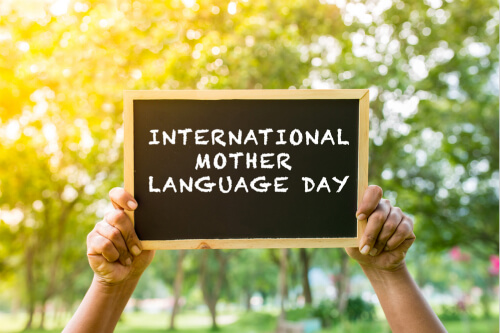
Message from Ms. Audrey Azoulay, Director-General of UNESCO, on the Occasion of International Mother Language Day文章源自英文巴士-https://www.en84.com/8830.html
教科文组织总干事奥德蕾·阿祖莱国际母语日致辞文章源自英文巴士-https://www.en84.com/8830.html
文章源自英文巴士-https://www.en84.com/8830.html
21 February 2020文章源自英文巴士-https://www.en84.com/8830.html
2020年2月21日文章源自英文巴士-https://www.en84.com/8830.html
文章源自英文巴士-https://www.en84.com/8830.html
Underscoring the power of language to unite across divides, Octavio Paz, upon accepting the Nobel Prize for Literature, said: “Languages are vast realities that transcend those political and historical entities we call nations.”文章源自英文巴士-https://www.en84.com/8830.html
文章源自英文巴士-https://www.en84.com/8830.html
奥克塔维奥·帕斯在诺贝尔文学奖获奖演讲中曾用这样一句话礼赞语言让人们超越分歧走到一起的力量:“语言所覆盖的广阔现实远远超乎我们称之为国家的政治和历史实体。”文章源自英文巴士-https://www.en84.com/8830.html
文章源自英文巴士-https://www.en84.com/8830.html
On this twenty-second edition of International Mother Language Day (IMLD), a day dedicated to all languages, UNESCO would like to highlight the unifying ability of mother tongues. By bringing their speakers closer together, by allowing them to flourish in a shared context, mother tongues generate social inclusion, innovation and imagination. They also breathe life into cultural diversity and serve as instruments of peace.
在第22个国际母语日这一所有语言的节日之际,教科文组织愿意再次强调母语的凝聚力。母语让不同的使用者心心相印,在共同的背景下充分发展,从而成为社会包容、创新和想象的源泉,也是文化多样性的载体和建设和平的工具。
Moreover, mother tongues are valuable allies in our efforts to achieve quality education for all. In fact, as UNESCO studies have shown, studying in a language which is not one’s own interferes with learning and increases inequalities. Yet according to the most recent estimates, 40% of the world’s citizens find themselves in this situation. Bilingual or multilingual education based on students’ mother tongue not only encourages learning, but also contributes to understanding and dialogue among peoples.
此外,母语还是我们实现全民优质教育目标的宝贵盟友。正如教科文组织的研究所示,在学校中使用非母语的语言学习会干扰学习进程,加剧不平等现象。然而,据最新统计显示,全球人口的40%都处在这样的情况之中。因此,以母语为主的双语或多语言教育不仅有助于学习,也可以增进人民之间的理解和对话。
For IMLD 2020, UNESCO has chosen the theme of languages without borders to draw attention to the way in which all languages, including mother tongues, contribute to intercultural dialogue and peace. Indeed, throughout the world, numerous cross-border languages bring their speakers closer to one another, turning borders into bridges instead of barriers.
教科文组织今年的国际母语日选择以“语言无国界”为主题,正是为了凸显所有语言,包括母语,对文化间对话与和平的贡献。在世界各地,有许多跨境语言拉近了使用者的距离,让边境不再是障碍,而是桥梁。
With 120 to 150 million speakers, Swahili is one of the world’s most thriving cross-border languages. Swahili is a hybrid influenced by languages from Southern Africa, Arab countries, Europe and India. A national and official language in the United Republic of Tanzania, as well as a national language of Kenya and the Democratic Republic of the Congo, Swahili is also a lingua franca in Burundi, northern Mozambique, Uganda, Rwanda and southern Somalia, and to a lesser degree in Malawi, South Sudan and Zambia.
使用者约1.2至1.5亿人的斯瓦西里语,就是最具活力的跨境语言之一。这是一种混合语言,融合了非洲南部国家、阿拉伯国家、欧洲和印度的语言元素。斯瓦西里语是坦桑尼亚的国家语言和官方语言,是肯尼亚和刚果民主共和国的国家语言,也是布隆迪、莫桑比克北部、乌干达、卢旺达、索马里南部的通用语言,在马拉维、南苏丹和赞比亚也有少量使用者。
A reflection of the region’s cultural diversity, cross-border languages are also part of the riches of Latin America. For example, the language of the ancient Inca empire, Quechua, has evolved into a family of indigenous languages which are spoken by 8 to 10 million people in Argentina, the Plurinational State of Bolivia, Chile, Colombia, Ecuador and Peru.
在拉丁美洲,跨境语言也是映衬出该地区文化多样性的瑰宝。克丘亚语就是一个例子:这个源于古老印加帝国的语言现在衍化成为一个彼此相关的土著语语系,在阿根廷、智利、哥伦比亚、厄瓜多尔和秘鲁约有800~1000万人使用这种语言。
As put so aptly by Vassilis Alexakis in his book La langue maternelle, “all languages teach us that we have roots more or less everywhere”.
瓦西利斯·亚历克萨基斯的一本小说就取名为《母语》,他曾说:“所有的语言都让我们认识到,我们的根遍布四方。”
Because they are instruments of diversity and peace, it is important that we protect mother tongues, particularly those which are indigenous languages. In this context, the International Year of Indigenous Languages, celebrated by UNESCO in 2019, provided an opportunity to rally the international community to support diversity, essential in our world.
正是因为母语是多样性与和平的工具,所以我们必须保护母语,特别是在涉及到土著语言的时候。在这样的背景下,教科文组织在2019年庆祝的土著语言国际年恰好提供了一个良好的契机,让国际社会围绕多样性议题动员起来。
A new chapter is beginning with this year’s edition of International Mother Language Day. At UNESCO Headquarters, several round tables will be held to discuss how cross-border languages and mother tongues can further help to achieve sustainable development. In the same spirit, UNESCO encourages everyone to take advantage of IMLD to celebrate the richness of humanity’s languages.
今年的国际母语日标志着一个新的阶段。教科文组织在总部举办的圆桌会议将探讨跨境语言和母语如何为可持续发展作出更大贡献。秉持同样的精神,教科文组织也邀请每一个人借此国际日的良机,礼赞我们丰富多彩的语言。

